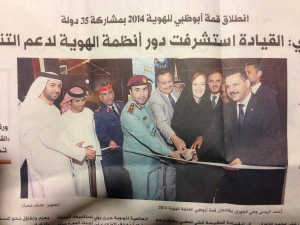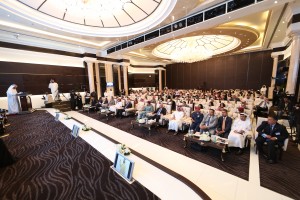World players debate global development goals, focusing on policies, resources and programs for sustainable development
Strategic societal and economic development goals were discussed in Abu Dhabi on February 24-25 at the Sustainability Summit, by government ministers from around the world, top representatives of international non-government organizations and decision makers from both public and private sectors. High-ranking delegates from 35 countries joined policy makers from around the world and pioneering innovators from the EMEA region at Wise Media’s seventh summit on sustainable development. The Sustainability Summit was hosted under the patronage of UAE Deputy Prime Minister and Minister of Interior, His Highness Lieutenant General Sheik Saif bin Zayed Al Nahyan, endorsed by the European Commission and the Emirates Identity Authority and opened its doors at the Emirates Centre for Strategic Studies and Research. His Highness Sheik Saif Bin Zayed Al Nahyan offered the Summit’s opening remarks, hosted ministerial meetings on February 23 and 24 and participated in policy makers meetings before visiting the exhibition on February 25. Government ministers from 7 nations, top representatives of international non-government organizations and decision makers from the public and private sectors contributed to a rich agenda of proceedings and exclusive meetings. The Secretary General of Interpol, the Inter-Regional Adviser of the United Nations and the Director International Relations of the European Commission cut the ribbon on the opening day of the Sustainability Summit.
High-profile participants and international organization representatives include: • Ronald Noble, Secretary General – Interpol • Richard Kerby, Inter-Regional Adviser – United Nations, USA • Luigi Soreca, Director General Home Affairs – European Commission • H.E. Atef Helmy, Minister of Communications and Information Technology, Egypt • H.E. Karim Sinjari, Minister of the Interior, Kurdistan • H.E. Mohamed Ibrahim, Minister of Information, Posts and Telecommunication, Somalia • Hon. A.Silima Pereira, Deputy Minister of Home Affairs, Tanzania • Erik Mothibi Molale, Permanent Secretary – Ministry of Labour & Home Affairs, Botswana • Maj. Gen. Tarek Mahdi, Governor of Red Sea, Egypt • Isaac Kgosi, Permanent Secretary in Office of the President – Botswana • Sayed Aqa – United Nations Development Programme • Minerva Novero-Belec, Bureau for Development Policy – UN Development Programme.
“A society granting prosperity throughout its social and economic structure cannot avoid leveraging the digital dimension,” said Sophie B. de la Giroday, President of Wise Media and Host of the Summit. “Digitalization is an answer to complexity and governments are progressing with the implementation of the digital society as a key enabler of sustainable development. This happens today in all regions world-wide, within the public and private sectors, whether through the establishment of its foundation in developing countries, or defining new avenues for its expansion in the developed world. “Modernization progresses at different speeds, revealing different levels of maturity of the supporting regulations and infrastructures. The advantages of turning to the digital dimension are nonetheless being leveraged across all key sectors, both domestically and internationally, with ongoing investments being made to empower communication platforms as a premise, and to define new trust models and innovative delivery schemes.
Opportunities for democratization, social and financial inclusion, as well as labor optimization can thus be pursued to uplift entire populations, while security and quality of life in modern metropolises, as well as legality throughout entire supply chains can be protected in the era of global cross-border trade and travel. “In light of global development goals, technologies play a key enabling role and request the pertinent efforts in terms of standardization to be streamlined within common masterplans. In the context of today’s information and communication infrastructures, creating or upgrading the functionality of identification schemes is a pivotal element. Many additional countries aim to reach the e-government milestone, empowering their society with trusted digital identities. From their side, developed countries seek new paradigms for secure communications, enabling cloud-based infrastructures for governments on a regional scale, envisaging open data standards.
Security and transparency of supply chains, as well as new delivery models, are the objective of the modernization of ICT infrastructures, which are similarly leveraging trusted identities in asset tracking and electronic transactions. “The Sustainability Summit succeeded in creating a neutral territory for a productive exchange at the highest level, focusing on policies, resources and programs for sustainable development. The Summit works for an inclusive digital society and aims to foster the paradigm shift towards a new era of collaboration: may it be public-private, inter-governmental, or international, collaboration is to become the norm in future strategic development plans surrounding the prosperity and stability of Nations, as well as communities,” added Sophie B. de la Giroday.
The two-days proceedings saw key development programs, international funding and cross-border collaborations at the center of debate. 66 speakers graced the stage at the event, in a rich conference agenda featuring some of the most senior and influential decision makers engaged in developing and spearheading today’s global ICT masterplans.
 From left to right: Dr. Ali Al Khouri, Director General Emirates Identity Authority; Major General Nasser Al Raisi, Director General, Central Operations, Abu Dhabi Police; Richard Kerby, Inter-regional Adviser at the United Nations; Sophie B. de la Giroday, President of Wise Media and Host of the Summit; Luigi Soreca, Director, International Relations, European Commission; Robald K. Noble, Secretary General Interpol.
From left to right: Dr. Ali Al Khouri, Director General Emirates Identity Authority; Major General Nasser Al Raisi, Director General, Central Operations, Abu Dhabi Police; Richard Kerby, Inter-regional Adviser at the United Nations; Sophie B. de la Giroday, President of Wise Media and Host of the Summit; Luigi Soreca, Director, International Relations, European Commission; Robald K. Noble, Secretary General Interpol.

